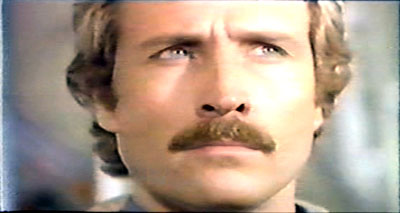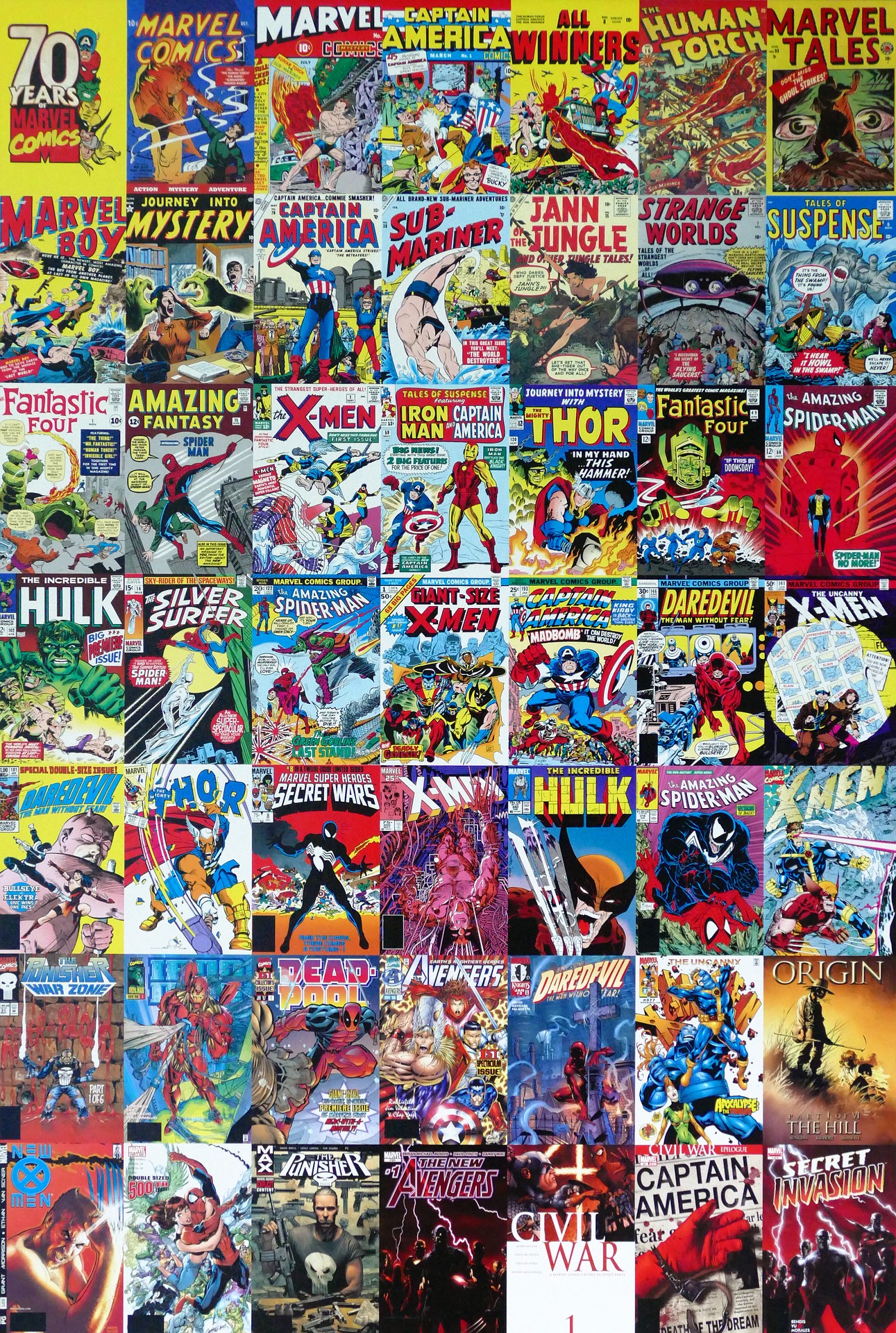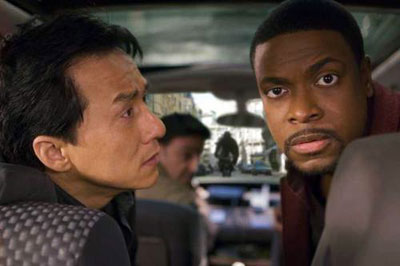Star Trek: First Contact (1996)
Directed by: Jonathan Frakes
Starring: Patrick Stewart, Jonathan Frakes, Brent Spiner, LeVar Burton, Michael Dorn, Gates McFadden, Marina Sirtis, Alfre Woodard, James Cromwell, Alice Krige, Michael Horton, Neal McDonough, Marnie McPhail, Robert Picardo, Dwight Schultz
![]()
![]()
![]() (out of 4)
(out of 4)
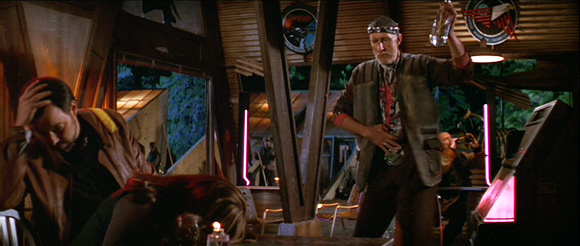
Just another night for Starfleet personnel
WARNING: Some spoilers ahead.
One of the most famous villains on Star Trek – first introduced by another famous villain in the TNG episode Q Who – are finally utilized in First Contact, the eighth Star Trek movie, probably because Generations was so underwhelming that Berman figured he better deliver more bang for the buck. Picking Jonathan Frakes (who plays First Officer Will Riker) to direct was an interesting move, but considering that Shatner and Nimoy had their shot I assume it must be some sort of tradition. Star Trek: First Contact can be considered Star Trek’s first, sole “action” entry, since part of the screenplay reads like “Die Hard” on a starship, and the opening scene features a huge space battle between a Borg cube and Federation ships which outdoes anything seen so far with Klingons or Romulans. Throw in a time travel storyline and a side story involving the creator of warp drive about to go on his first flight, and – surprisingly to me – you have a decent sci-fi actioner, even if I don’t consider it a “real” Star Trek film. No, it’s more like a collection of cool sequences tied together by TNG characters.
Before we go any further, some background story is required: the Borg are a group of powerful cybernetic beings who act as a collective/hive mind. There are no individuals in this collective. Their purpose is to conquer species, and assimilate their technology (and their lifeforms) in order to improve the collective. Captain Jean-Luc Picard (Patrick Stewart) has a nightmare, illustrated effectively with a camera pullback from his eye, where he relives his assimilation by the Borg years earlier (see: The Best of Both Worlds). In that episode, the Borg kidnapped him, put a bunch of implants in him (including a really cool red laser beam), and turned him into something called Locutus. Eventually saved by Riker and crew, Picard is naturally pissed off, which makes a good jumping off point into the obvious Moby Dick/Captain Ahab metaphors of this film. One side effect, not told in the series, is that Picard can now sense when Borg are nearby – kinda like your nose twitching when a storm is coming, I suppose. So, when Admiral Hayes says that the Borg are headed for Earth, our captain is not surprised.
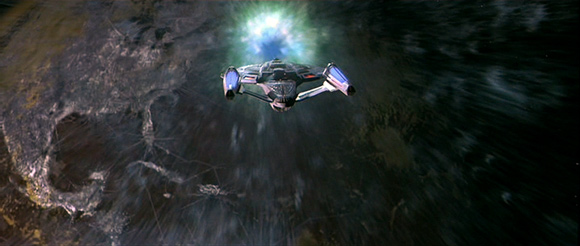
The Enterprise E witnesses the effects of the BP Oil Spill
After helping to save Earth by destroying the Borg cube in a flashy special-effects battle sure to make everybody who owns a copy of the Star Trek: The Next Generation Technical Manual wet their pants a little, some of the Borg escape in a small sphere (they love their shapes), which creates some kind of temporal vortex, sucking the Enterprise-E (wow, they built that fast) into the past – April 4, 2063, to be exact. This is the day before Zephram Cochrane’s famed warp flight, which is the event that literally saves humanity. The Borg’s aim is to stop the flight, thus avoiding first contact with aliens who will witness it, and leave humans wide open to easy assimilation. At this point, the movie splits into two separate stories – the one set on the Enterprise where Picard, Data, Worf, and Crusher must stop the Borg from assimilating the ship, and the second story which takes place on Earth, where Riker, Troi, and LaForge must convince Cochrane the drunken pilot (well played by James Cromwell) to embrace his destiny and take off on his souped-up nuclear rocket-ship.
Before taking on Star Trek 8, you should probably accept certain flaws that might otherwise hinder your enjoyment of the film, as I had to do. The most obvious is that the whole film operates on a premise that makes no sense. I’m not talking about time travel – which has been used to death in the Trek universe and at this point is not worth the nitpicking. I’m talking about the Borg themselves. The biggest problem with giving the Federation a technologically advanced and practically omnipotent enemy is that you will eventually write yourself into a corner. At that point, your way out is probably a deus ex machina (which, strangely enough, was needed in the episode of their very first appearance). Otherwise, you’ll have to retcon and rewrite your species into something a little less competent. How else to explain why the Borg only send 1 lousy cube to Earth, especially after their last cube was blown up by the Enterprise crew? Why not send 5 to 10 cubes and be done with it? Because that would make for a very short movie, that’s why. Then there is the questionable decision for the Borg sphere to go into Earth’s past – if the idea is to assimilate human technology, certainly doing it in the 21st century, after a devastating nuclear war, would be a waste of time. And if it isn’t, then why not just go back in time to begin with?

The Borg finally got in after slipping the dude a fiver.
My other big problem is based more on principle than on execution – it concerns the Borg queen (Alice Krige). There was never any mention of a Borg queen on TNG, but Berman and company probably felt the Borg as a faceless enemy wouldn’t work for a movie – they, like almost everyone else since Wrath of Khan, embraced the idea that you need a heavy to carry the film. (How boring!) So they cooked up this story of an individual, grotesque, but seductive female cyborg who “brings order to chaos.” OK, if you like, but I always found the Borg disturbing because of their lack of any individuals or leaders – like a faceless, emotionless mass. Bringing a Borg queen to the table reduces the Borg drones to mere robot/zombies obeying a master.
With that said, in creating the Borg queen Star Trek 8’s writers have given Data an interesting foil, and probably the best scene in the film. Having captured Data, Queenie gives him real skin, and observes his pleasure when she blows on the little hairs on his arm. Data is tempted by his new flesh, and when he can’t handle it she urges him to tear it out “like you would a defective circuit.” Obviously, he can’t do it, and then we witness a most freaky Queenie-Data makeout session. Now that’s odd sex for you! I liked these scenes because they give Data some character growth and offer more insight into the nature of beings that are part-machine, part-flesh. It’s alien. In another universe, a great Trek movie might have been a Borg flick with Data as the main character instead of Picard.

Now we're talking First Contact!
But we have to go with what we’re given, so back on Earth, Cochrane is horrified that everyone sees him as a hero and great historical figure, when he just created warp engines for money and naked women! So, the story of First Contact is also one of a beleaguered man coming to terms with his place in history. And as with all Trek, it’s about humanity improving itself – in this case, rising from the ashes of a third world war. Of course, we have no idea how the economics of the future really work, even though Picard tells Cochrane’s assistant Lily (Alfre Woodard) that money no longer exists. If you ask me, that’s the real deus ex machina in the whole franchise – I have a hard time accepting that warp drive, dilithium crystals, or making friends with the Vulcans would solve war, poverty, and disease in one generation, but I digress. The ending moments of Star Trek 8 center around Picard’s Ahab-like behavior concerning the Borg, thus clouding his judgment about how to defeat them. I laughed when Lily brings up the parallels but then later admits “actually, I never read it.” (So Cliff’s Notes will survive into the 21st century!) First Contact movies pretty fast, and doesn’t stop for too long to hand-hold, so Lily’s character also helps as a stand-in for the non-Trek audience, which was probably a good move.
Star Trek: First Contact is tightly edited, with good effects (ILM), and a good musical theme (Jerry Goldsmith). Its worthiness as a “Star Trek” film is suspect, since it takes too many liberties with Trek characters and lore, but as a sci-fi/action/space-opera it delivers the goods. I find its closest counterpart in Star Trek IV: The Voyage Home – another “non-Trek” movie that worked because it was good comedy. The film probably only deserves 2.5 stars (especially for some goofy dialogue: “You’re astronauts, on some kind of star trek” and “Assimilate this!”) but I’ll throw in an extra half-star, because sometimes I like cheese, I like space-zombies, and I like things blowing up. (This is my way of saying Star Trek 8 is a guilty pleasure). This film could have been a disaster, but it is much better than it has any right to be. However, now that Rick Berman, Brannon Braga, and Ronald Moore no longer involved with Trek, I must ask all future Trek writers: no more time travel, OK? (You hear me, J.J. Abrams?) Thanks.
– Bill Gordon

Try, try again, Skynet...
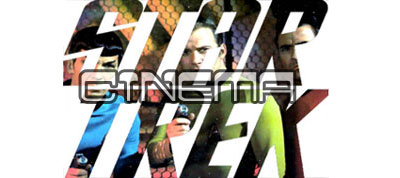
A look at the movies of Star Trek

